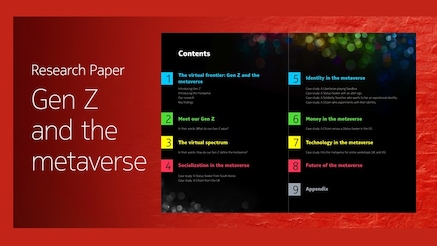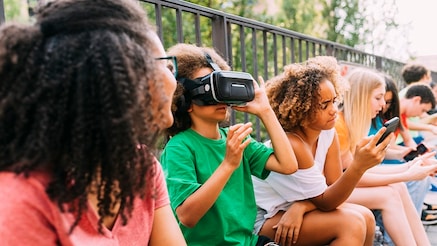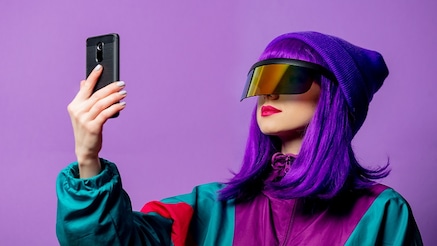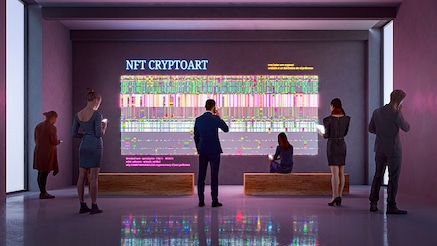Alex Binello created role-playing game, MeepCity, because he loved Roblox and had been using the platform since his early teens. The game was highly successful – attracting 15 million monthly visitors – but perhaps most surprisingly it beat out some very big competitors. His secret was he understood exactly the kind of experiences his Generation Z peers wanted.
Welcome to the metaverse – a digital universe promising unparalleled opportunities for people and brands worldwide. But success is not guaranteed. As Alex’s story has shown, the metaverse is best understood by those that already use it and who will undoubtedly shape its development – Gen Z. These digital natives were raised on social media and have always had the world at their fingertips.
To understand more, Nokia partnered with Ipsos to reach out to Gen Z across the UK, US, Korea, Brazil, and UAE via the metaverse. Using a comprehensive methodology, including immersive workshops, in-depth play-a-long sessions, and existing research for context, we wanted to know what has drawn this generation – the leaders of tomorrow – to the metaverse and what it means for the future.

Research paper
Download the report
Gen Z and the metaverse – Country insights reports
Five country specific reports - Brazil, UAE, UK, US, South Korea - are now available in English and localized languages.
Discover the six key findings from the report
1. Awareness of the metaverse is low, but engagement is high
“There is, frankly, little difference between the digital world and the real world,” explains an 18-year-old tech adopter from South Korea. This view is commonplace with Gen Z. They have friends at school. They play games with these friends. At home, they tap into elements of the metaverse in the games they play with new friends they’ve made. For Gen Z, while not always understanding what it entails, the metaverse is merely an extension of the world they live in. With the lines becoming increasingly blurred, the only real difference is in the experiences they can have in the metaverse.
What it means: The metaverse is here to stay, and businesses can’t afford to ignore it.

2. The social experience is a key draw to the metaverse
“You’re always socializing,” says a 25-year-old tech adopter from the US. “You can play customization games. The social element makes the community feel connected. It’s not just some guy in a suit dictating what we should play; it’s a game driven by users.”
The metaverse is where Gen Z can search for connections with those who share unique interests, defying the boundaries of geography to take part in virtual experiences with people they value. In the physical world, groups of people are thrown together, such as in a class at school, and individuals have to find people with similar interests. With shared interests already, it’s easier to do that in the metaverse.
What it means: Technology needs to evolve for real global collaboration as this is likely to remain a mainstay for this generation throughout their lives.

3. Identity in the metaverse is a new opportunity for experimentation
“The metaverse is good for people who want to be who they are but can’t in real life,” explains one 18-year-old from the US. The metaverse presents an opportunity to experiment with identities without prejudices often felt in the physical world. Creating avatars that reflect complementary aspects of identity makes users feel freer to be ‘themselves.’
What it means: Identity covers technology, governance, and the nuts and bolts of individual avatar creation. These will all be important considerations for developers of the metaverse.

4. Digital assets are a draw for some
During this year's Roblox Developers Conference, it was announced that in-game ads would be rolled out next year on the platform. While Gen Z is highly aware of digital assets – with many purchasing in-game items or level-up boosts – many are wary of attempts to commercialize the metaverse. A 25-year-old from Brazil is one of them: “I don’t like this dynamic. MOBA [Multiplayer online battle arena] games are pay-to-win because you buy the best rune, these kinds of things.”
It’s feared that money and commercialization could taint the metaverse, entrenching the inequality and struggles many from Gen Z experience. Instead, they seek a free, fair and flexible metaverse for all.
What it means: There are clear commercial opportunities within the metaverse, but brands should tread carefully as they risk alienating future consumers. This could also risk deepening the digital divide.

5. Technology is central to their conception of the metaverse
“The VR glasses are my favorite piece of technology,” explains a 24-year-old from the UAE. “They allow me to engage in activities like flying planes and driving cars – the technology is amazing.” Influenced by the futuristic virtual worlds in popular culture, many hope technology such as VR and AR will bring greater levels of immersion and experience to the metaverse. Accessibility remains a concern, with many from Gen Z identifying inequality as the root of technical issues.
What it means: The development of improved XR devices – especially those at a lower price point – will drive the future of the metaverse. Globally available, low latency networking is essential for universal immersive experiences.

6. Gen Z wants to build the metaverse, so it reflects their values
Enthusiastic about the future of the metaverse – especially the ability to socialize and play through uniquely virtual experiences – Gen Z is concerned about its future impact on society and the role of social inequalities in the metaverse limiting accessibility for all. “When you’re low income,” explains an 18-year-old male from the US, “it’s not about cool clothes, it’s about having clothes. If I ever have to choose between having something in real life or Roblox, it will be real life every time.”
To free the metaverse from the burdens that could limit accessibility and create exclusion while providing the open space of free expression they desire, Gen Z wants to play a role in shaping it.
What it means: Generation Z expects the metaverse to be communal, flexible, and open to all. Brands that fail to respect this may come unstuck.


Gen Z and the metaverse – GLOBAL insights report
Global research paper on how Gen Z currently live in the metaverse and the role they want to play in its future.

Gen Z and the metaverse - COUNTRY insights reports
From our global research five country specific reports - Brazil, UAE, UK, US, South Korea - are now available in English and localized languages.
Key takeaways
Whether we’re talking about the consumer metaverse, the enterprise metaverse, or the industrial metaverse, our research shows that the things that matter to Gen Z need to be reflected in how the metaverse develops over the next ten years.
- Businesses cannot ignore the metaverse – tomorrow’s consumers and business leaders are already heavy users, often without even realizing it.
- Don’t lump all young people together – although metaverse platforms are incredibly popular amongst under-25s, they’re being used for various purposes in various ways, which will significantly impact how they develop
- The right blend between physical and digital experiences will be trial and error for everyone – most young people are only using the metaverse part-time, which is unlikely to change. However, digital experiences will be increasingly critical in social and working life.
- Technology development sits front and center of the metaverse experience – between affordable devices, the low latency necessary to have meaningful experiences, and the ability to generate and retain avatars, consumer technologies will drive the metaverse’s future.
- Global collaboration is very much the future – interest and acceptance of other cultures are essential for a generation that has grown up online. This virtual collaboration will continue throughout their adult lives and shape metaverse experiences inside and outside the workplace.
- Brands should not just see this as a marketing opportunity – brand authenticity has become increasingly important since the pandemic, and those who see this as a chance to ‘cash in’ may fail.
- The principle of inclusivity is critical to the development of the metaverse – the metaverse is still in its early days, and the future stakeholders want it to be safe, happy and for everyone.




